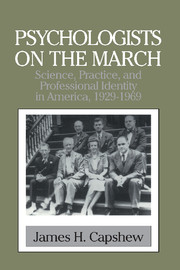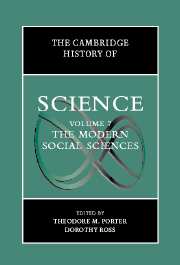Psychologists on the March
Psychologists on the March argues that the Second World War had a profound impact on the modern psychological profession in America. Before the war, psychology was viewed largely as an academic discipline, drawing its ideology and personnel from the laboratory. Following the war, it was increasingly seen as a source of theory and practice to deal with mental health issues. With the support of the federal government, the field entered a prolonged period of exponential growth that saw major changes in the institutional structure of the field that spread to include the epistemological foundations of psychology. This book is the first sustained study of this important era in American psychology. Moving back and forth between collective and individual levels of analysis, it weaves together the internal politics and demography of psychology in relation to the cultural environment. It is based on extensive archival research and includes extended discussions of the wartime reformation of the American Psychological Association, the role of gender politics, the rise of reflexivity, and the popularization of psychology, among other topics.
- In-depth history of the impact of Word War II on the American psychological profession
- Wide ranging and highly topical study
Reviews & endorsements
"The overall contribution to the historiography of psychology is very refreshing." Richarf T. von Mayrhauser, Ph.D., Journal of the History of the Behavioral Sciences
"This rich and detailed chronicle supplies a summary of psychology's role in the second great war of the century..." Journal of the History of Medicine
"...James H. Capshew's Psychologists on the March...promises a wide-ranging analysis of scientific, technological, and professional development in psychology during the middle third of the century. Capshew's writing is clear if uninspired, and his attitude toward psychology professors is uniformly respectful and appreciative. Notable in particular is his ability to synopsize psychologists' work in various government programs. Readers who are very familiar witth developments in psychology will find the book informative." Isis
"...impressive study...This book's most significant contribution, however, is its exceoptionally clear analysis of institutional history...Capshew's deeply researched and lucidly argued narrative goes a long way toward explaining psychology's remarkable evolution. The result is an extremely valuable analysis of a most unusual profession - one whose influence on twentieth-century American life is incontestable." Bull. Hist. Med.
"...extremely readable and accessible..." APA Review of Books
"...the most comprehensive survey of this period yet available. Nowhere else, is such a readable and complete story available." Journal of the History of Neurosciences
"James H Capshew's Psychologists on the March is an ambitious book...Psychologists on the March is thus an impressive book." The Jrnl of Amer. His. March 01
"This book will be widely red as the most thorough narrative, in terms of which to compare and argue individual views and experiences. Any psychologist interested in the steps by which the occupation has become such a massive presence in American life will get enormous stimulus and much information from the book." Contemporary APA Review of Books 2000
Product details
January 1999Paperback
9780521565851
292 pages
229 × 153 × 22 mm
0.43kg
Available
Table of Contents
- Introduction: the psychologists' war
- 1. Growing pains: after the Great War
- 2. Mobilizing for World War II: from national defense to professional unity
- 3. Home fires: women psychologists and the politics of gender
- 4. Sorting soldiers' psychology as personnel management
- 5. Applied human relations: The utility of social psychology
- 6. From the margins: making the clinical connection
- 7. Engineering behavior: applied experimental psychology
- 8. A new order: postwar support for psychology
- 9. Remodeling the academic home
- 10. The mirror of practice: towards a reflective science
- 11. Beyond the laboratory: giving psychology away
- Epilogue: science in search of self.








